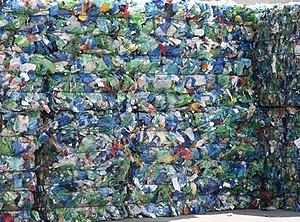RECYCLING UK
Leading plastics reclaim firm slams waste plastics ban proposals / “Be careful what you wish for”, says Re-Gen boss
 Doherty says the proposed ban interferes with trade in a valuable commodity (Photo: Panthermedia/moreno.soppelsa) |
The head of a leading plastics recycling firm in Northern Ireland has compared a proposed ban on exports of plastics waste by 2027 to taking “a sledgehammer to crack a nut”.
Joseph Doherty, managing director of Re-Gen Waste (Newry; www.regenwaste.com) and a member of the Department for Environment, Food and Rural Affairs’ (Defra) Advisory Committee on Packaging, said it was important to consider the origin of the resins in the first place.
“In 2021, 50% of plastic packaging was manufactured from imported material and nearly 30% of packaging waste came from imported products,” he said. “As a proportion of the total plastic packaging recycling, exports have rapidly declined since 2016 from nearly 70% to 45% in 2021.
“New capacity is being slowly developed in the UK, and this decline will continue. But a ban on exports by 2027 is not only impractical, it is interfering with trade in a commodity for which there is global demand.”
Related: Majority of UK firms still in the dark over packaging tax
In November 2022, the Defra committee of UK Parliamentarians called for a ban on the export of all plastics refuse from the UK by 2027 in order to reduce the country’s contribution to global plastics waste pollution. Noting that the UK exports around 60% of the over 2.5 mn t of plastics packaging waste it creates, the committee said with 27%, Turkey was the main destination for the material.
MPs said in the short term they want to restrict the amount of waste that can be exported from the UK, and then for exports to be banned completely. Stepping up enforcement of existing rules to prevent criminal gangs illegally exporting and dumping UK-produced waste should also be a priority.
Related: Trade bodies urge EU regulators to strengthen proposed waste rules
But Re-Gen’s Doherty argued that a more effective way of controlling export quality and investing in UK capacity would be a ban on exports of plastics waste that has not been processed into a clean commodity by 2027, as happens in Australia.
“We must be very careful what we wish for,” he added. “A blanket ban in isolation of a wider strategy would be detrimental to the UK’s recycling ambitions. There needs to be a coordinated long term plan which provides the right conditions for investment to achieve long term sustainability, and not knee-jerk reactions to illegal activity that is more about poor enforcement than it is about global supply chain requirements.”
Joseph Doherty, managing director of Re-Gen Waste (Newry; www.regenwaste.com) and a member of the Department for Environment, Food and Rural Affairs’ (Defra) Advisory Committee on Packaging, said it was important to consider the origin of the resins in the first place.
“In 2021, 50% of plastic packaging was manufactured from imported material and nearly 30% of packaging waste came from imported products,” he said. “As a proportion of the total plastic packaging recycling, exports have rapidly declined since 2016 from nearly 70% to 45% in 2021.
“New capacity is being slowly developed in the UK, and this decline will continue. But a ban on exports by 2027 is not only impractical, it is interfering with trade in a commodity for which there is global demand.”
Related: Majority of UK firms still in the dark over packaging tax
In November 2022, the Defra committee of UK Parliamentarians called for a ban on the export of all plastics refuse from the UK by 2027 in order to reduce the country’s contribution to global plastics waste pollution. Noting that the UK exports around 60% of the over 2.5 mn t of plastics packaging waste it creates, the committee said with 27%, Turkey was the main destination for the material.
MPs said in the short term they want to restrict the amount of waste that can be exported from the UK, and then for exports to be banned completely. Stepping up enforcement of existing rules to prevent criminal gangs illegally exporting and dumping UK-produced waste should also be a priority.
Related: Trade bodies urge EU regulators to strengthen proposed waste rules
But Re-Gen’s Doherty argued that a more effective way of controlling export quality and investing in UK capacity would be a ban on exports of plastics waste that has not been processed into a clean commodity by 2027, as happens in Australia.
“We must be very careful what we wish for,” he added. “A blanket ban in isolation of a wider strategy would be detrimental to the UK’s recycling ambitions. There needs to be a coordinated long term plan which provides the right conditions for investment to achieve long term sustainability, and not knee-jerk reactions to illegal activity that is more about poor enforcement than it is about global supply chain requirements.”
08.12.2022 Plasteurope.com [251671-0]
Published on 08.12.2022
